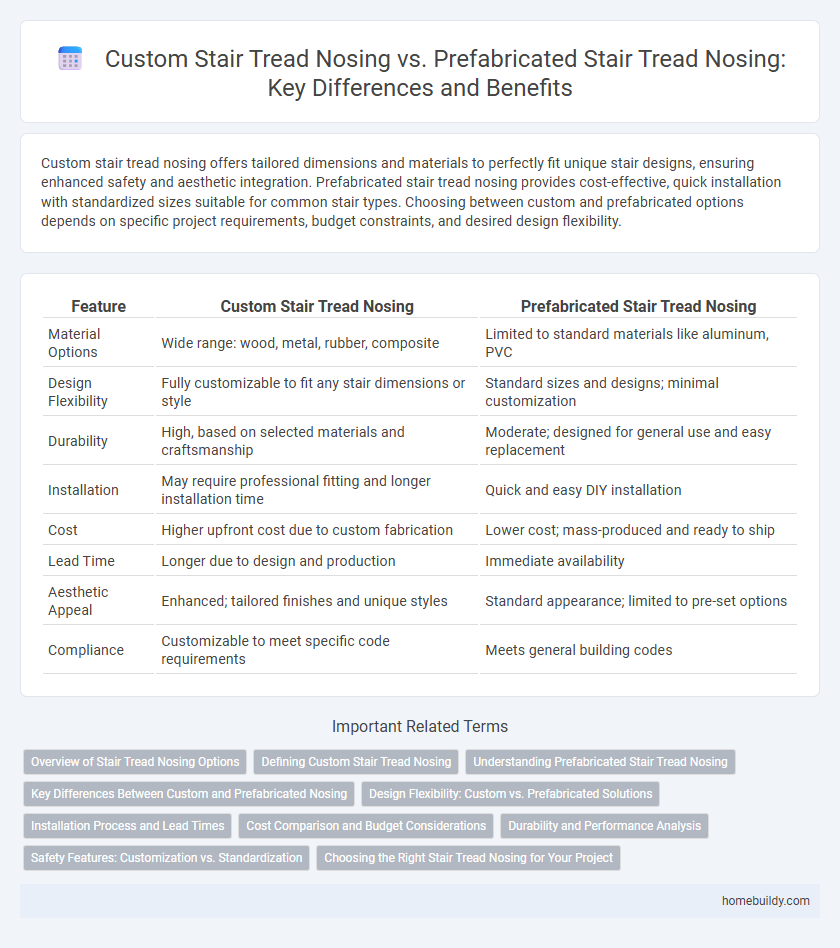Custom stair tread nosing offers tailored dimensions and materials to perfectly fit unique stair designs, ensuring enhanced safety and aesthetic integration. Prefabricated stair tread nosing provides cost-effective, quick installation with standardized sizes suitable for common stair types. Choosing between custom and prefabricated options depends on specific project requirements, budget constraints, and desired design flexibility.
Table of Comparison
| Feature | Custom Stair Tread Nosing | Prefabricated Stair Tread Nosing |
|---|---|---|
| Material Options | Wide range: wood, metal, rubber, composite | Limited to standard materials like aluminum, PVC |
| Design Flexibility | Fully customizable to fit any stair dimensions or style | Standard sizes and designs; minimal customization |
| Durability | High, based on selected materials and craftsmanship | Moderate; designed for general use and easy replacement |
| Installation | May require professional fitting and longer installation time | Quick and easy DIY installation |
| Cost | Higher upfront cost due to custom fabrication | Lower cost; mass-produced and ready to ship |
| Lead Time | Longer due to design and production | Immediate availability |
| Aesthetic Appeal | Enhanced; tailored finishes and unique styles | Standard appearance; limited to pre-set options |
| Compliance | Customizable to meet specific code requirements | Meets general building codes |
Overview of Stair Tread Nosing Options
Custom stair tread nosing offers tailored dimensions and materials to precisely fit unique stair designs, enhancing safety and aesthetic appeal. Prefabricated stair tread nosing provides a cost-effective, readily available solution with standardized sizes and finishes suitable for common stair configurations. Choosing between custom and prefabricated options depends on project specifications, budget constraints, and desired durability level.
Defining Custom Stair Tread Nosing
Custom stair tread nosing is specifically designed and fabricated to match the exact dimensions, materials, and aesthetics of a staircase, ensuring seamless integration and enhanced safety. Unlike prefabricated stair tread nosing, which comes in standard sizes and finishes, custom nosing accommodates irregular stair shapes, unique architectural designs, and specific durability requirements. This tailored approach provides superior slip resistance and long-term performance tailored to individual project specifications.
Understanding Prefabricated Stair Tread Nosing
Prefabricated stair tread nosing offers consistent dimensions and materials, ensuring uniform safety and durability across multiple installations. These nosings are typically manufactured from materials like aluminum, rubber, or vinyl, providing enhanced slip resistance and wear protection. Their standardized design simplifies installation and maintenance compared to custom stair tread nosing, making them a cost-effective choice for commercial and residential projects.
Key Differences Between Custom and Prefabricated Nosing
Custom stair tread nosings provide tailored dimensions, materials, and finishes to perfectly fit unique staircases, enhancing both safety and aesthetic appeal. Prefabricated stair tread nosings come in standard sizes and designs, offering quicker installation and cost savings but limited customization options. The key differences lie in the adaptability to specific stair configurations and the balance between personalization versus convenience and price.
Design Flexibility: Custom vs. Prefabricated Solutions
Custom stair tread nosing offers unmatched design flexibility, allowing precise adaptation to unique stair dimensions and aesthetic preferences. Prefabricated stair tread nosing typically comes in standard sizes and designs, limiting customization options and potentially requiring modification for a perfect fit. Choosing custom nosing ensures a seamless integration with stair geometry and materials, enhancing both safety and visual appeal.
Installation Process and Lead Times
Custom stair tread nosing requires precise measurements and on-site fabrication, leading to longer installation times but ensuring a perfect fit for unique stair dimensions. Prefabricated stair tread nosing offers quicker installation with standardized sizes and pre-finished surfaces, significantly reducing lead times and labor costs. Choosing between the two depends on project deadlines and the need for tailored design versus efficiency in installation.
Cost Comparison and Budget Considerations
Custom stair tread nosing typically incurs higher initial costs due to tailored design, material selection, and labor expenses compared to prefabricated stair tread nosing, which benefits from mass production efficiencies and standardized sizes. Budget considerations must account for long-term durability and maintenance, as custom options may offer better performance and aesthetic integration, potentially reducing replacement frequency and associated costs. Evaluating project scope, material quality, and installation complexity is crucial to determine the most cost-effective option between custom and prefabricated stair tread nosing solutions.
Durability and Performance Analysis
Custom stair tread nosing offers superior durability by allowing materials and dimensions to be tailored specifically to stair usage patterns, resulting in enhanced resistance to wear and impact compared to prefabricated options. Prefabricated stair tread nosing, while convenient and cost-effective, often utilizes standardized materials that may not withstand heavy foot traffic or harsh environmental conditions as effectively. Performance analysis indicates custom solutions provide longer lifespan and better safety outcomes due to precise fitting and material optimization.
Safety Features: Customization vs. Standardization
Custom stair tread nosing offers tailored safety features, allowing precise adjustments in material, grip texture, and dimensions to match specific stair conditions and reduce slip hazards effectively. Prefabricated stair tread nosing provides standardized safety elements that meet general building codes and durability requirements, ensuring consistent performance across various settings. Choosing custom nosing enhances safety through adaptation to unique structural needs, while prefabricated options guarantee reliable protection with tested and uniform specifications.
Choosing the Right Stair Tread Nosing for Your Project
Custom stair tread nosing offers tailored dimensions and materials, ensuring precise fit and enhanced durability for unique or irregular staircases. Prefabricated stair tread nosing provides cost-effective, readily available options with standardized sizes, suitable for typical residential or commercial stairs. Selecting the right stair tread nosing depends on the project's specific requirements, budget constraints, and desired aesthetic, with custom options excelling in customization and prefabricated options excelling in convenience.
Custom stair tread nosing vs prefabricated stair tread nosing Infographic

 homebuildy.com
homebuildy.com